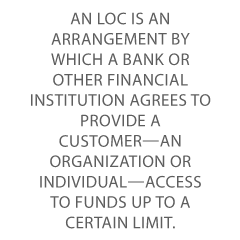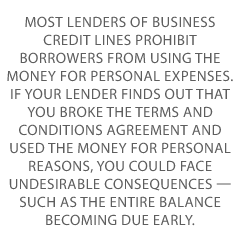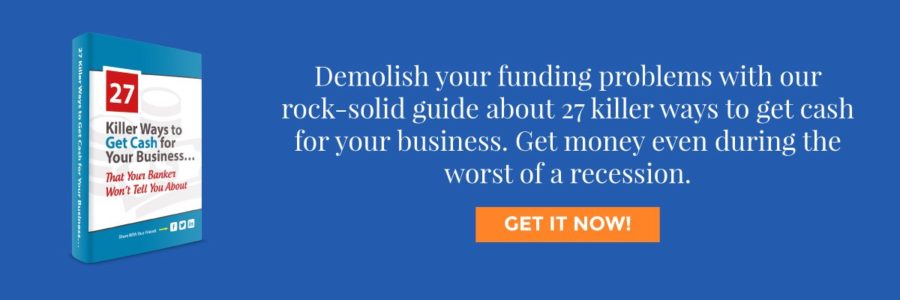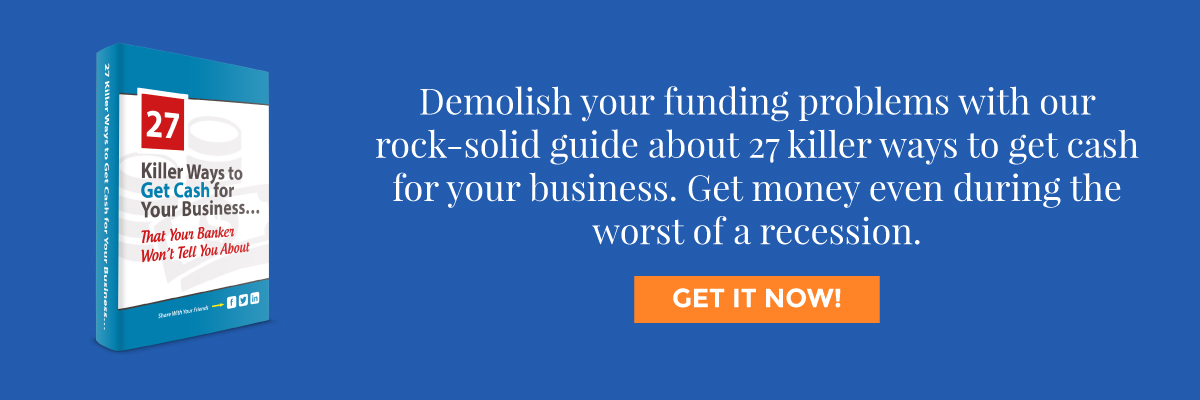It’s Probably True: You Need a Recession Business Credit Line
As a small business owner, you probably can’t put your hand on enough capital, at least not immediately. And if you are new, then it’s even harder. There will always be more ramp up costs than you think. So if you have ever wondered where to establish business credit, and how to actually get a credit line, it comes from really two areas. Those are business credit cards and loans. Your business needs a recession business credit line: here is how to get one (or more!)
For both types of credit line, it helps to have good business credit. And if you do not have what is considered a good business credit score, or if your company is new and has not yet established its own credit, then creditors will look at your personal credit score.
You want them looking at your business credit score.
But let’s start with recession-era funding.
Recession Period Financing
The number of US financial institutions as well as thrifts has been decreasing slowly for 25 years. This is coming from consolidation in the market in addition to deregulation in the 1990s, reducing barriers to interstate banking. See: https://www.fundera.com/blog/happened-americas-small-businesses-financial-crisis-six-years-start-crisis-look-back-10-charts
Assets concentrated in ever‐larger banks is problematic for local business owners. Big financial institutions are much less likely to make small loans. Economic downturns imply financial institutions end up being a lot more careful with lending. Luckily, business credit does not rely on financial institutions.
Let’s go over credit lines.
Your Business Needs a Recession Business Credit Line – But What Are Credit Lines?
A credit line, or line of credit (LOC), is an agreement between a borrower and a bank or private investor that establishes a maximum loan balance which a borrower can access.
A borrower can access funds from their line of credit anytime, so long as they don’t go over the maximum set in the arrangement, and as long as they meet any other conditions of the financial institution or investor like making prompt payments.
Advantages
Your business needs a credit line because credit lines deliver many distinct advantages to borrowers including versatility. Borrowers can apply their line of credit and only pay interest on what they use, in contrast to loans where they pay interest on the sum total borrowed. Credit lines can be reused, so as you acquire a balance and pay that balance off, you can use that accessible credit again, and again.
Details
Credit lines are revolving accounts similar to credit cards, and contrast other forms of funding like installment loans. In many cases, lines of credit are unsecured, much the same as credit cards are. There are some credit lines which are secured, and thus easier to get approval for
Credit lines are the most frequently sought after loan type in the business world even though they are popular, true credit lines are unusual, and hard to find. Many are also very difficult to qualify for requiring good credit, good time in business, and good financials. But there are various other credit cards and lines which few know about that are attainable for startup companies, poor credit, or even if you have absolutely no financials.
Your Business Needs a Recession Business Credit Line from The SBA
The majority of credit line varieties that most entrepreneurs imagine come from standard banks and conventional banks use SBA loans as their principal loan product for small business owners. This is because SBA guarantees as much as 90% of the loan in the event of a default. These credit lines are the hardest to get approval for because you must qualify with SBA and the bank.
SBA Loans
There are two fundamental sorts of SBA loans you can normally obtain. One type is CAPLines. There are in fact 4 types of CAPLines that can work for your small business.
You can also get a smaller loan amount more quickly using the SBA Express program. The majority of these programs offer BOTH loans and revolving lines of credit.
From the SBA … “CAPLines is the umbrella program under which SBA helps business owners meet short-term and cyclical working capital needs”. Loan amounts are offered up to $5 million. Loan qualification criteria are the same as with other SBA programs.
Seasonal Line
This one advances against foreseen inventory and accounts receivables. It was designed to assist seasonal businesses. Loan or revolving are on offer.
Contract Line
This one finances the direct labor and material costs of performing assignable contracts. Loan or revolving types are available.
Builders Line
This one was made for general contractors or builders constructing or renovating industrial or residential buildings. This line is for fund direct labor-and material costs, where the building project functions as the collateral. Loan or revolving types are on offer.
Working Capital
Borrowers must use the loan proceeds for short term working capital/operating needs. If the proceeds are used to acquire fixed assets, lender must refinance the portion of the line used to acquire the fixed asset into an appropriate term facility no later than 90 days after lender discovers the line was used to finance a fixed asset.
Your Business Needs a Recession Business Credit Line from SBA Express
You can get approval for as much as $350,000. Interest rates vary, with SBA allowing banks to charge as much as 6.5% over their base rate. Loans in excess of $25,000 will need collateral.
Approval Details
To get approval you’ll need great personal and company credit. Plus the SBA says you should not have any blemishes on your report. An acceptable bank score demands you have at least $10,000 in your account over the most recent 90 days.
You’ll also need a resume showing you have business sector experience and a well put together business plan. You will need three years of company and personal tax returns, and your business returns should show a profit. And, you’ll need a recent balance sheet and income statement, thereby showing you have the cash to pay back the loan.
Collateral
To get approval you’ll need account receivables, but just if you have them. As for the collateral to offset the risk, often all company assets will function as collateral, and some personal assets which also include your home. It’s not unheard of to need collateral equivalent to 50% or more of the loan amount. You also need articles of incorporation, business licenses, and contracts with all third parties, and your lease.
Your Business Needs a Recession Business Credit Line from Private Investors and Alternative Lenders
Private investors and alternative lenders also offer credit lines. These are easier to qualify for than conventional SBA loans. They also necessitate much less documentation for approval. These alternative SBA credit lines ordinarily require good personal credit for approval.
Unlike with SBA, many of them don’t require good bank or business credit approval. Most of these sorts of programs call for two years’ of tax returns. Tax returns have to show a profit. Rates can vary from 7% or greater and loan amounts range from $25,000 into the millions.
Loan amounts are normally based on the revenues and/or profits on tax returns. In some cases lenders may ask for other financials such as a profit and loss statement, balance sheets, and income statements.
Your Business Needs a Recession Business Credit Line from Merchant Cash Advances
Merchant cash advances have rapidly become the most popular way to get financing, in large part because of the simple qualification process. Businesses with $10,000 in revenue can get approval, with the business owner having scores as low as 500.
Some sources have now even begun to offer credit lines that accompany their loans. You must have at least $10,000 in revenue for approval. You should be in business for at least one year, however three years is better. Lenders usually want to see a credit score of 650 or better for approval.
Details
Loan amounts are usually about $20,000. Lenders routinely do pull your business credit, so you ought to have some credit already and sometimes lenders will want to see tax returns.
Rates differ, due to the risk for this program, and there aren’t a lot of funding sources who offer it.
Your Business Needs a Recession Business Credit Line from Securities as Collateral for Financing
You can get financing despite personal credit if you have some form of stocks or bonds. You can also get approval if you have somebody intending to use their stocks or bonds as collateral for financing.
Personal credit quality doesn’t matter as there are no consumer credit criteria for approval. You can get approval for as much as 90% of the value of your stocks or bonds. Rates are commonly lower than 2%, making this one of the lowest rate credit lines you’ll ever see. You can still earn interest as you typically do on your stocks and bonds.
Demolish your funding problems with our rock-solid guide about 27 killer ways to get cash for your business. Get money even during the worst of a recession.
Credit Cards and Lines are Very Similar
Credit cards typically offer 0% intro rates for up to two years. This is also very useful for startups especially. And credit lines let you take out more cash at a more affordable rate than do cards. These are the main two differences that will have an effect on you between credit cards and credit line.
Investopedia even says that “lines of credit are potentially useful hybrids of credit cards.”
Both cards and lines are revolving credit. Credit lines are more difficult to qualify for as card approvals are typically very fast, many times automated, while at the same time line require an in-depth underwriting review. Lines usually offer lower rates, according to Bankrate card rates average 13% while lines average 4%.
Your Business Needs a Recession Business Credit Line from Unsecured Business Credit Cards
The majority of these cards report to the consumer credit reporting agencies. They all demand a personal guarantee from you. You can get approval typically for one card max as they stop approving you when you have two or more inquiries on your report.
Most credit card providers furnish business credit cards including Capital One, Chase, and American Express. These have rates similar to consumer rates and limits are also similar.
Some of them report to the consumer reporting agencies, some report to the business bureaus. Approval requirements resemble consumer credit card accounts.
Inquiries
Often, when you apply for a credit card you put an inquiry on your consumer report. When other lenders see these, they will not approve you for more credit since they have no idea how much other new credit you have lately obtained.
So they’ll only approve you if you have no more than two inquiries on your report within the most recent six months. Any more will get you refused.
Your Business Needs a Recession Business Credit Line from Our Credit Line Hybrid
With this form of business financing, you work with a lender who concentrates on securing business credit cards. This is a very unusual, very little know of program that few lending sources offer. They can usually get you three to five times the approvals that you can get on your own.
This is because they are familiar with the sources to apply for, the order to apply, and can time their applications so the card issuers won’t reject you for the other card inquiries. Individual approvals oftentimes range from $2,000 – 50,000.
The end result of their services is that you oftentimes get up to five cards that mimic the credit limits of your highest limit accounts now. Multiple cards create competition, and this means they will raise your limits, frequently within 6 months or fewer of first approval.
Approvals
Approvals can go up to $150,000 per entity like a corporation. With a hybrid credit line they actually get you three to five business credit cards which report just to the business credit reporting agencies. This is significant, something most lenders don’t offer or advertise. Not only will you get funds, but you build your business credit as well so in three to four months, you can then use your new corporate credit to get even more money.
Rates
The lender can also get you low introductory rates, often 0% for 6-18 months. You’ll then pay normal rates after that, typically 5-21% APR with 20-25% APR for cash advances. And they’ll also get you the very best cards for points. So this means you get the very best rewards.
Just like with just about anything, there are HUGE benefits in dealing with a source who specializes in this area. The results will be much better than if you try to go at it alone.
Demolish your funding problems with our rock-solid guide about 27 killer ways to get cash for your business. Get money even during the worst of a recession.
Qualifications
You must have excellent personal credit right now, preferably 685 or better scores, the same as with all business credit cards. You shouldn’t have any negative credit on your report to get approval. And you must also have open revolving credit on your consumer reports now and you’ll need to have five inquiries or fewer in the most recent six months reported.
Fees
All lenders within this space charge a 9-15% success based fee and you only pay the cost off of what you secure. Bear in mind, you get a ton of extra advantages and about three to five times more cash in this program than you could get on your own, which is why there’s a fee, the same as all other lending programs.
You can get approval making use of a guarantor and you can even use a number of guarantors to get even more money. There are likewise other cards you can get utilizing this very same program but these cards only report to the consumer reporting agencies, not the business reporting agencies. They are consumer credit cards versus business credit cards.
Benefits
They furnish similar benefits which include 0% intro annual percentage rates and five times the amount of approval of a single card but they’re a lot easier to get approval for.
You can get approval with a 650 score and seven inquiries (or fewer) in the most recent six months and you can have a bankruptcy on your credit and other negative items. These are a lot easier to get approval for than unsecured corporate credit cards.
With all previous cards above, you have to have good consumer credit to get approval but what happens if your personal credit is not good, and you do not have a guarantor?
This is the time when building corporate credit makes a great deal of sense even when you have good personal credit, setting up your company credit helps you get even more money, and without having a personal guarantee.
Demolish your funding problems with our rock-solid guide about 27 killer ways to get cash for your business. Get money even during the worst of a recession.
Your Business Needs a Recession Business Credit Line But You Can’t Get One? Then Start Building Better Business Credit
As with personal credit, it seems as if the companies which don’t need credit are the ones which are more likely to get it. But that is banks and creditors doing better and more responsible business for themselves – if your company is at risk of defaulting, they either want to give you more expensive terms, or not extend any credit at all.
Here are a few tips on building and improving better business credit.
Separate Your Company Credit From Your Personal Credit
One way is to change your business entity. That is, to either incorporate or become a limited liability company (LLC). Get a separate identification number from the IRS, too, in order to really demonstrate there is a difference.
Get a D-U-N-S Number from Dun & Bradstreet
A D-U-N-S number is necessary in order for D&B to start tracking your business’s credit. Dun & Bradstreet requires that you register on their site before they will give you a D-U-N-S number. Registration is simple and, once you have said yes to the Terms and Conditions, then the next screen is a dashboard. This is where you either ask for a D-U-N-S number or you can look up to see if your business is already in the listings. If your company is already in the listings, then click on your business name to make any needed changes.
Business Credit with a Personal Guarantee
Another means of establishing business credit is by going to your bank and establishing business credit lines or cards with personal guarantees. This means you are personally responsible in case the business defaults or any loans or bills go into collections. Hence if your company is in a high risk business or a seasonal one, you might find your car on the line.
Make sure when you get these kinds of business credit cards, they have the personal guarantee removal feature built right in. Keep your credit utilization at one third of your credit ceiling or less (that is, don’t use more than about one third of your total available credit). Make certain to pay on time every time.
Apply for Third Party Guaranteed Lending
You can use an SBA loan for funding. Repaying this kind of a loan will help you build your business credit score. Or you can apply for a business credit card from a specific store. Often, these store credit cards do not need a personal guarantee. Make sure to choose a store where your business makes a lot of purchases. And don’t forget about those timely payments!
Business Credit Cards and Loans
If your business credit score is good (or if it has improved), then go to your local bank and ask for a credit line. And if you use a particular bank for payroll, you can try that one. If not (or maybe you’re a one-person shop and you don’t really have payroll at all), then you can also take your request to the bank where you do all your personal banking.
Because they already know you, and if they have seen you pay your credit cards on time and keep a good balance in your accounts, they may be more interested in giving your small business a line of credit even without guarantees or a serious credit check. No matter which kind of lending institution you try, go in with good credit as that will make your terms more favorable and it can generally mean the difference between any credit line and none.
Your Business Needs a Recession Business Credit Line – Takeaways
Your business can get credit cards and financing, if you know where to look. Learn more here and get started toward establishing business credit. Keep your small business afloat with a credit line.
The post Get a Recession Business Credit Line – Here’s How appeared first on Credit Suite.
The post Get a Recession Business Credit Line – Here’s How appeared first on Buy It At A Bargain – Deals And Reviews.













